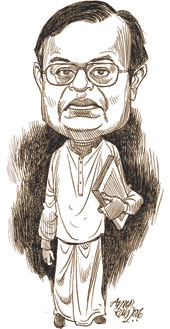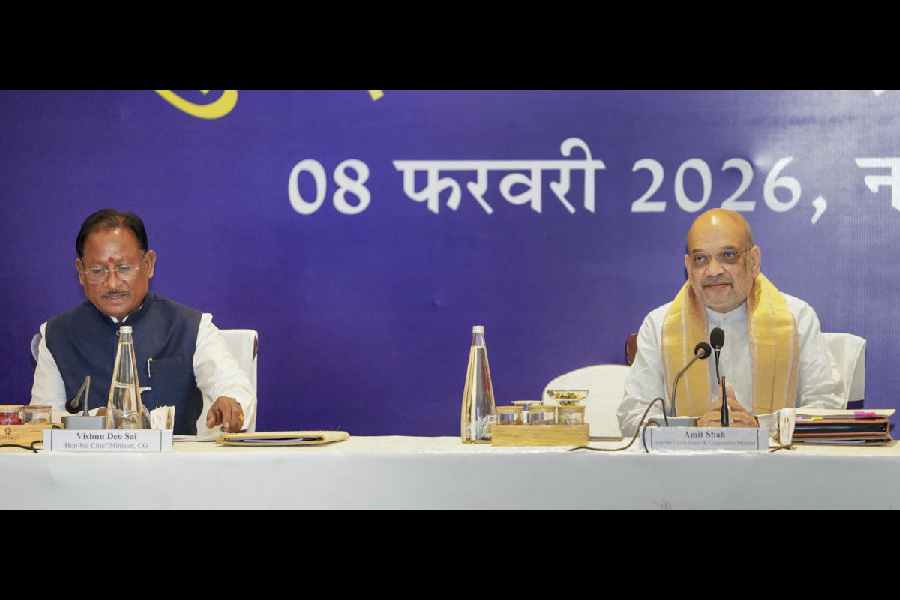 |
When finance minister Palaniappan Chidambaram presented his third Budget in a row last week as a member of the UPA government and his fifth since he entered public life, the irony was inescapable. After his stint as finance minister in the United Front government in the mid-1990s, the Harvard-educated lawyer had nursed ambitions of becoming chief minister of Tamil Nadu one day. But Chidambaram may finally end up equalling C.D. Deshmukh’s record of being the finance minister who presented the most (seven) Budgets.
Chidambaram, 60, may never make it to the top of Tamil Nadu politics. He may have started out as a leftist, but he is now anything but an aamjanata man. More at ease with English speaking middle and upper middleclass Indians, he has little in common with the masses. That is perhaps to be expected of a member of the M.A. Chidambaram family and a relative of Raja Sir Annamalai Chettiyar of Chettinad. As the late P. Rangarajan Kumaramangalam, power minister in the NDA government and a rival of Chidambaram when Kumaramangalam was in the Congress, once put it: “Chidambaram was born with a silver spoon in his mouth. We are very wealthy too but the difference is that I taught my children to wash the toilets in our house.”
Chidambaram is not a politician with a mass base. He does not easily tolerate fools. He is overly thin-skinned for a politician. He can be quick tempered, and curt on the telephone ? which he often answers himself at home before his secretary lands up in the morning. Nor is he one to seek a consensus among his bureaucrats before taking a decision. Last fortnight, a senior Planning Commission functionary said that the finance minister did not listen to people, unlike his predecessors, Jaswant Singh and Yashwant Sinha.
“In policy matters, he’s not a step-by-step person. He wants to go the whole hog immediately,” says S.L. Rao, former power industry regulator and a former director general of the National Council of Applied Economic Research. “And he can be quite stubborn ? if he does something, he doesn’t like to withdraw it.”
Yet the finance minister is charming and polite at home and leads a spartan life. Unquestionably, too, he is incorruptible (he’ll never do favours for people). He is hard working ? he usually arrives at North Block at 9 am and puts in long hours at work ? and has a brilliant mind. Few could have rewritten India’s trade policy in a day, as Chidambaram did in 1991. Even fewer could have dictated the chapters of a new Export-Import rules book in the course of a Sunday, working till midnight, as Chidambaram and then commerce secretary A.V. Ganesan did at Chidambaram’s house in New Delhi. And he’s always been ambitious. When the P.V. Narasimha Rao government assumed office in 1991, Chidambaram told the Prime Minister that he wanted Cabinet rank. It’s another matter that Rao didn’t oblige, and Chidambaram had to be content with being minister of state for commerce.
When he was minister of state for personnel, public grievances and pensions in Rajiv Gandhi’s government, he launched several innovative training programmes for government officials. At the commerce ministry, he was an articulate spokesman for exporters and exports.
He has always been a liberaliser in the government, pushing hard for reforms in the belief that they become irreversible once they’re implemented. When you’re batting, he told a journalist when he was finance minister in the United Front government, you go all out to score as many runs as possible.
He scored a huge number of runs in the governments of H.D. Deve Gowda and I.K. Gujral because both Prime Ministers largely left economic policy to him (the decision to appoint Bimal Jalan as governor of the Reserve Bank of India was entirely his, he once confided). But if he’s not led the charge on big ticket reforms in his current innings, it’s perhaps because he’s been hemmed in by the Left and the demands of the Common Minimum Programme. Also, in Manmohan Singh he has a Prime Minister who is an economist and a former finance minister ? and the government’s agenda is set by the Prime Minister.
Inducted into politics in the early 1970s by the late C. Subramaniam, Chidambaram stuck with Indira Gandhi after the Congress split. The late G.K. Moopanar was then appointed president of the Tamil Nadu Congress Committee (TNCC) and Chidambaram became one of the TNCC general secretaries. His relationship with Moopanar lasted for nearly 24 years. Moopanar brought him to the attention of Rajiv Gandhi in 1984. He is still a trustee of the Rajiv Gandhi Foundation. “He was and is quite active at the foundation,” notes economist Bibek Debroy, who spent some years as director of the Rajiv Gandhi Institute of Contemporary Studies.
His marriage to lawyer Nalini, the daughter of a former Supreme Court judge, attracted attention because she was from a different caste. The Chidambarams shuttle between their ancestral home with its magnificent sculptures at Kaanadukaathan, near Karaikudi, and their modern house in Chennai.
Unlike most politicians, he pursues his legal career when out of power. And unlike other successful lawyers, he does not charge astronomical fees ? in the 1990s, when most lawyers charged a consultation fee of well over Rs 1 lakh, Chidambaram would charge less than half of this.
All this paints a portrait of a man who has few interests other than politics and government. But his resume suggests that he plays badminton, chess and tennis and that he has an interest in Tamil literature (he’s a member of Chennai’s Ilakkiya Chintanai, or literary association), as his Tamil stanzas in Budget speeches testify. Yet the big question remains ? where does he go from here as a politician? Perhaps that’s one question to which the articulate lawyer has no answers.










